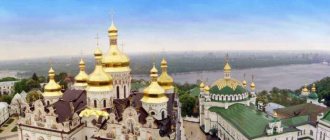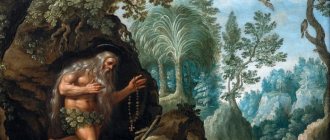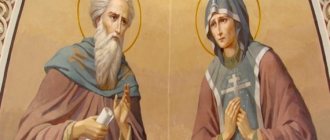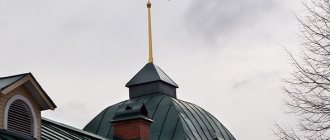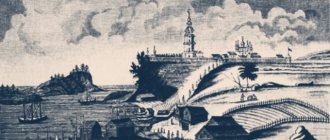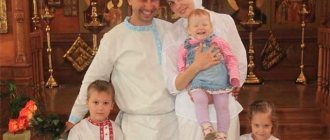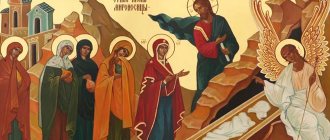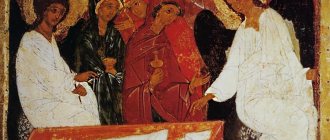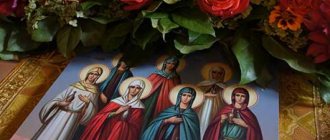Diveyevo oxbows
Sixteen kilometers from Diveevo, in the village of Puzo (now Suvorovo), in the mid-nineteenth century, a daughter was born to Alexander and Alexandra Shikov in a peasant family. The girl was named Evdokia at baptism. When Duna was two years old, her mother died and her father remarried. A few years later he left for Siberia, the girl remained in her native village with relatives.
Dunya's uncle was a church elder. Pious relatives managed to instill in Dunyasha love for God and neighbors. At the age of nine, the young woman, together with her friend Maria, visited the monasteries in Sarov and Diveevo.
Evdokia was weak from childhood; her peers laughed at her and often threw stones at her and her friend. The girl bravely endured beatings and ridicule, only in prayer asking the Lord to strengthen her. When the youth Maria died, Dunyasha was not allowed passage at all.
When the girl turned twenty, she became seriously ill. For the rest of the years she had to bear the cross of illness with humility. From that time on, Evdokia was bedridden. The Lord did not abandon his chosen one; she was granted spiritual vision. Fellow villagers and believers from surrounding villages came to her for spiritual advice and sought prayerful help. Believing girls received visitors and looked after sick girls.
According to the stories of contemporaries, pious girls often came to Blessed Evdokia’s house, they prayed together, sang stichera, kontakion and akathists. General singing began at eight o'clock in the evening, and the service continued until twelve o'clock at night. Matins began at five o'clock in the morning. And they prayed until twelve o'clock in the afternoon.
Cell attendant Polina said: “Dunya shared the morning rule, and there was about twenty minutes of rest; If during the rest someone came with great sorrow, she would let him in, but during the rule she would not let anyone in. After the rule, she was turned to face the icons, a runier was placed under her, she was seated and all 12 lamps were lit. After this they sang “I Believe...”, “Worthy...”, “Our Father...”, “Intercessor...”, “Like an insurmountable wall...”, “Ourotokos of Tenderness...”, “Cross of the entire universe...”...
Dunya was given crushed prosphora... He orders her to wash her hands, and when they give her the prosphora, she will cry and say: “Cross your hands.” They will put prosphora on her and cut it in half. One half will be taken back to the closet, and this half will be cut in half, and she gives half to the one who served her. They gave her three prosphora: from Sarov, Ponetaevka, Diveevo, so she got three parts.
They will lift the samovar onto the table, put the incense in the pipe, fill the kettle with tea and place it on the incense, at this time they cut off some bread for her. And so she will mark each piece with the sign of the cross, and she will put all these pieces in a scarf and put them on the bed, and she will leave herself one piece of rye bread and eat a small part of it. (Those pieces that she tied and put on the bed, after six weeks she put them behind her back and slept on breadcrumbs.)
She ate little... Just before tea, she cut a cucumber and ate two slices or a salted mushroom, she would bite into a pie once, when God sent... She had not eaten meat since her youth, only two eggs a year... She consumed bread from the same people (the woman baked with prayer) ... Dunya said that whoever eats soft bread is not a faster, but if you fast and get your hands on soft bread, that’s bad. Dunya baptized every piece and said: “Christ is Risen!” If he does not complete the prayer rule, he will lie for three days without food.
Since her youth she had never touched money. During Sunday mass, Dunya forbade the stove to be lit and approached the shrine strictly, and recently she did not allow the floors to be washed, and she allowed laundry to be washed only on Tuesday and Thursday, and during this work she did not give prosphora from her table, did not allow dinner at home and straighten the lamp, but she was allowed into the church; after the floors, she ordered to wash your hands with soap, eat a piece of bread and take a book in your hands - the Psalter or prayer book. Only after two days did she allow people to venerate the icons; also after the bath. You have to walk around in the same shoes all month, no matter how damp or hot, you can’t take off your shoes. The legs of walkers will become so swollen that it is impossible to stand on their feet all day, without rest and without sleep; the feet are damp, but won’t let you warm up; For the whole month she did not allow her to change her underwear and scarf, and in front of the people she denounced her: she is a nun, but she is dirty.
So that they would not know her feat, she said: “Now there is no day of joy,” and she herself did not eat and did not give it to anyone. And then the bell will be rung for the deceased - he can no longer eat, or something else will happen, all these were reasons not to eat. So it will go from day to day. When the dead person is being carried, she lies motionless, and if she eats at this time, she will throw it away, and tells everyone to be silent. And until then she lies motionless until he is buried, and will not allow anyone into the cell at that time.”
To the cell attendant’s question: “Dunya, why do you treat the dead this way?”, the blessed one answered: “The voice of the Lord - when the bell was rung - explained that they should pray for the slaves”).
According to the stories of the cell attendant of Blessed Evdokia, the ascetic wore chains, which she had as a belt. The blessed one did not allow me to change my shirt until it was worn out. She blessed her cell attendants to wash her hands and feet only once a year. Her hands were washed with soap up to the elbows, then they were doused in a basin of holy water; the legs were washed up to the knees, but with plain water (the body was never washed). When her feet were washed, the blessed one held a lit candle. She was allowed to wash her hair only once a year with warm oil heated in the stove. In winter and summer, the blessed one wore a sheepskin coat, woolen clothes, and covered her head with a woolen shawl. She did not allow anyone to cut her hair or cut her nails.
For her great humility and patience, the ascetic was awarded the Gifts of the Holy Spirit of insight and healing.
Let us cite just a few cases that testify to the insight of Blessed Evdokia and the power of her prayers.
The son of one pious widow came twice to the perspicacious elder Evdokia to receive a blessing to enter the monastery, but she, according to contemporaries, “neither gave a blessing, nor did she let him into his cell,” she only said: “Let him not ask to enter the monastery.” , he won’t live there anyway””... The young man did his own thing, labored in the monastery for three years, but then left the monastery and became a communist in Nizhny Novgorod...
One day, the maiden Paraskeva from the village of Veryakushi, suffering from a stomach illness, came to the blessed one; she said that she could not even eat rye bread. Blessed Evdokia handed her rye crackers from her bed and ordered her to eat, adding: “I myself am sick, but I eat rye crackers.” Paraskeva ate it and recovered. From that day on, she began to eat everything. The grateful father of the healed girl bought a cell for Evdokia’s cell attendants and began to give alms for the glory of God (according to the stories of his fellow villagers, before this incident he had been stingy).
According to eyewitnesses, one day Blessed Evdokia denounced a woman who came to her: “You don’t have a cross.” The woman objected: “Yes.” After the blessed one began to cry, the woman confessed that she did not have a cross on her and asked for forgiveness. The ascetic ordered the cell attendants to give her a cross.
One day, Blessed Evdokia ordered the pious spouses Nikifor and Martha, who came to sing to her, to return home earlier. They objected: “Dunya, we will sing until the end.” The seer replied: “No, you need to go home.” Obediently, the couple returned home and on time: “their calf got entangled... almost hanged himself.”
Pyotr Pavlovich from the village of Glukhovo also came to the blessed one to sing stichera; he once confessed to the blessed one that he was afraid to return in the dark (after midnight). Blessed Evdokia consoled: “The angels will shine on you.” Pyotr Pavlovich later said that when he went out into the street, a ball of fire rolled in front of him, so he followed it all the way to the house, and praised the Lord for the great mercy shown to him, a sinner, through the prayers of the righteous woman.
Through the prayers of Blessed Evdokia, those who had stumbled returned to a righteous life, and thanks to her advice and warnings, the life of the spouses was improved. The righteous woman was known and revered by many in the area, and people from monasteries came to her for advice and consolation. The blessed one also helped the monastics financially. She often said: “I consider the clergy and the people of the monastery as angels.”
The sufferers who came to the blessed one always tried to thank the prayer book, bringing food, products, materials, but the seer did not take from everyone, and the cell attendants were not allowed to touch the products without a blessing. There have been cases when envious people brought poisoned food. One day, someone put cottage cheese in the entryway before Easter, the cats smelled it, climbed onto the bench, ate it, and died.
The blessed one advised not only food, but to protect everything with the sign of the cross, including windows and doors, clothes, shoes, and bed, before going to bed. Fence livestock in the morning and evening. She said that women who were unclean should not enter the temple until the sixth day.
According to the stories of cell attendant Polina, Blessed Evdokia taught the girls humility, patience and obedience. In front of people she could denounce, innocently slander, so that they learn to humble themselves and not become proud.
For Christ's sake, the holy fool Evdokia, who voluntarily gave up her flesh to be tortured by lice, suffered from cold and hunger, and was often weakened by days of strict fasting, was distinguished by great courage and patience. It was revealed to her that martyrdom would soon await her, she knew through whom she would have to suffer, nevertheless, she let this man into the cell.
When the blessed one heard that someone had been shot, she said: “Still, they are burying them, but they won’t bury me and they won’t ring the bells. Lord, Lord, what happy people, if they die, they call, and they will throw me into a pit like a beast.” She advised believers: “Go to my grave more often, you will cry and sob at my grave, I will hear everything, but I cannot answer.” The cell attendant Polya advised: “I will die, you accept the schema, I will die, and you will remain, and if you don’t accept, then you will be punished by God.” Polya replied: “I, Dunya, am uneducated.” “Whoever lives with me will all be scientists. Try to pray for me, and I will not forget you there. Go to the monastery." Shortly before her death, after her hands and feet were washed, she said: “Give me the shirt I prepared for death, it’s thicker, it will be warmer.” The blessed one predicted: “I will live until autumn, I will lead a new life, and you prepare all your own bread, I won’t cook for you anymore, then it will be easy for you all to live, and you will bring it to me from Babin.”
Soon after the revolution, government officials decided to deal with Blessed Evdokia, an excuse was found, a conscript who had been delayed from leave was found in her cell, and the blessed one was accused of harboring a deserter.
One of the surviving cell attendants said that in the summer of 1919, soldiers burst into the old lady’s house: “At first two of them came, they entered and began to read the paper: who lives here among the residents. They all had them copied out... I didn’t leave, I looked out the window. I see that he found prosphora and oil, threw them in Duna’s face and began calling her nasty names... And then he began to drag her by the hair and began to beat her with a whip, but did not touch the walkers in the cell. Then he took wax candles, twisted ten of them together, lit them and began throwing icons and looking for money.”
The blessed one was beaten until evening. When the soldiers left. Cell attendant Dasha decided to move her to another house, fearing for her life. But on the way they met soldiers who again attacked the righteous woman. They carried her into the house, laid her on a bench, beat her all night alternately, beat her with whips, dragged her to the floor, and kicked her. Believers gathered near the house, some tried to rush to help, but the guards did not let anyone in.
According to eyewitnesses, when the Iveron Icon of the Mother of God was taken out of the cell on Sunday, “there was a radiance from Her.” When they threw away the blessed woman’s things, the peasants managed to take some of the icons to the church. Many books and icons were destroyed.
From the memoirs of the cell attendant of the blessed old woman: “On Monday morning, some believers entered her through the back gate, and the soldier was a good one and did not beat her at that time. Dunya asked the people: “I need to be initiated, call the priest.” Father o. Vasily Radugin came, but they didn’t let him in. He asked them for a pass, the most important ones, and they gave him one. He came to Duna, confessed and communed them all two hours before his death...” On August 5/18, 1919, the blessed old woman and her cell attendants were destined to suffer martyrdom. (The cell attendants are Daria Siushinskaya, Daria Timolina, Maria Neizvestnaya, who hid her name.)
According to eyewitnesses, when the blessed one and her cell attendants were taken to execution, their faces were unusually beautiful. One unbelieving peasant, Ivan Anisimov, told him that he saw white doves on each person’s shoulders.
A woman who threw stones at the believers who came to the blessed one was also given a vision. Early in the morning at dawn, she saw four pillars of fire above the ascetic’s cell: “Two grew together like a fork (when the ascetics were taken out of the house, the cell attendant carried the blessed one out in her arms), and two were separate.”
The condemned were brought to the place of execution in the cemetery. Puzov peasants Peter, Ivan and Makar tried to intercede for the martyrs, but were beaten with whips. Blessed Evdokia saw this and said: “Look how their sins fall away. Sins fly from Makar, like leaves from a broom in a bathhouse, as they beat him for me.” Pyotr Karasev later said that he did not feel any pain from the blows: “I would be happy if they beat me again for Dunyushka.”
Not far from the freshly dug grave, the girls were seated with their backs to the crosses and shot. They wanted to throw the executed into the grave, but a pious fellow villager, Vasily Sednov, managed to get ahead of them; he jumped into the grave first and began to accept the bodies of the martyrs for his faith. (According to the testimony of Vasily, the blessed old woman wore chains.) Vasily covered their faces with handkerchiefs, after which they were covered with earth. For a long time, believers were not allowed to approach the grave.
From the story of the old woman’s spiritual daughter: “Then the soldiers left the grave and instructed to ensure that the priest did not come to the grave and perform the funeral service for them. After this, they began to see a burning candle on the grave, and in its place at twelve o’clock in the afternoon, at the same time, shortly after the execution, the sun was playing ten fathoms from the ground.”
After the blessed one and her cell attendants were killed, the authorities did not even allow the commemoration of the righteous woman for forty days; only in the village of Babino did a priest pray for the repose of the souls of the righteous women, and a requiem service was served in the blessed one’s cell. According to the testimony of this priest, at a time when the doctors feared for his life, he received healing from a throat disease through the prayers of the righteous woman, this is how he told the cell attendant of Blessed Evdokia, Polina: “The Apostle Thomas enters, then the Venerable Seraphim, Elder Nicodemus and Dunya: I didn’t see her face, but she came in with them, took them by the throat and said: “Get up, you’ll be healthy, go and serve mass, it’s a pity, you weren’t with me alive.” I saw everyone’s faces, but I didn’t see her, I only heard her voice.” (The priest said that the saints said that Blessed Evdokia was with them.)
Deacon Jonah from the village of Puzo, who entered the Oran monastery with the blessing of Blessed Evdokia, saw a vision of thousands of people, many bishops and clergy, flowing to her grave, and serving at her grave.
Blessed Maria Ivanovna of Diveyevo said: “Go to Duna’s grave more often, there the Angels sing incessantly.” One day Polya came to Blessed Maria Ivanovna, the Diveyevo Blessed told her: “In my name the Belly will burn three times,” and clapped her hands three times. “There Dunina’s rags are burning, her blood is burning out.” On the third day, a fire engulfed the house of a woman, who rejoiced when the martyr’s things were thrown out of the house and carried them into her house. During the fall, “Dunya Rags” caught fire three times in the village. Blessed Maria Ivanovna predicted that “Dunya will come out in relics, four bishops will carry her, there will be four coffins, and there will be thousands of people, and then everyone will cry, and the unbelievers will believe.” (Eight decades later, in 2001, the holy relics of the Puzov martyrs will be found.)
And after the death of the ascetic, miracles of healing occurred at her grave. One day, Anna, who was suffering from an eye disease, came to the grave of God’s servant, the widow tearfully asked the blessed one for help, fell to the grave - and received what she asked for. Many believers witnessed this healing.
In 1967, Anna Silaeva, who suffered from a bladder disease, poured dirt from the grave of the righteous woman into the water and drank this water. Soon she was completely healed.
In 1983, at the grave of Blessed Evdokia, the servant of God Natalia sang a requiem with the singers. After the funeral service, Natalya knelt at the edge of the grave and asked Blessed Evdokia to heal her leg. We read the akathist to the Iveron Icon of the Mother of God and set off on the return journey. Soon Natalya felt that she was walking easily and not limping. Through the prayers of the righteous woman, Natalya was healed.
Sayings of Blessed Evdokia
If you are fasting, then do not eat soft rye bread, and do not eat your fill.
If you don’t eat for a day, and the next day you cook good food for yourself, God will not accept such a fast.
If you pray for people, so that people can see you, but you don’t have this in your soul, this is not prayer.
Man seeks salvation, and salvation seeks man. They go to each other and will not find each other.
If there is no sorrow during a feat, and if only everyone pleases and honors you, your feat will not reach the Lord, but if the feat is for the sake of God, then there will certainly be sorrow.
If the enemy is defeated, he will act through a person.
For disobedience, the Lord allows illness.
In 2001, the holy relics of the Puzov martyrs were discovered. Memory - August 5/18 and the Council of New Martyrs and Confessors of Russia. (Sunday January 25th or the nearest day after January 25th).
Prayer to the holy martyrs Evdokia, Daria, Daria and Maria
O wondrous ascetics and intercessors of our martyr Evdokie, Darius, Daria and Mary - the ancient father of the imitator of the truth, who lived in the closeness of obedience without reasoning, vigil and fasting exhaustingly - now we resort to you and, falling to your relics, we pray to you: O holy passion-bearers, gentle lambs, stained with the blood of Christ for the sake of them and tortured and slaughtered for three days by cruel traitors; O seers, who have snatched many souls from eternal destruction and who were informed of sufferings before death from the Lord, O healers and wonderworkers not only in the lands of Nizhny Novgorod, but throughout the entire Russian country, who have shone forth - do not leave us to perish in sins and iniquities, but help us in repentance Let us end our life in truth, glorifying the Holy Trinity of the Father and the Son and the Holy Spirit forever and ever. Amen.
Blessed Diveyevo: Pelagia, Paraskeva and Mary
The Lives of the Blessed Saints Pelageya, Paraskeva and Maria of Diveyevo
Life of St. Pelagia (Serebrennikova)
Pelagia Ivanovna was born in 1809 in Arzamas, and grew up in the house of a stern stepfather. According to her mother’s stories, she was strange from childhood, and her mother quickly tried to marry off the “fool.” Two sons and a daughter of Pelagia Ivanovna died in infancy. When the young couple visited Rev. Seraphim in Sarov, he talked for a long time with Pelagia, gave her a rosary and said: “Go, mother, immediately to my monastery, take care of my orphans, and you will be the light of the world.” After that, every day she seemed to lose her mind more and more: she began to run through the streets of Arzamas, screaming ugly, and at night she prayed on the porch of the church. Her husband did not understand her feat, beat her and mocked her, chained her. Once, at his request, the mayor cruelly punished Pelagia Ivanovna; her mother said: “Her body hung in tatters, blood flooded the whole room, and at least she gasped.” After this, the mayor saw in a dream a cauldron with a terrible fire, prepared for him for torturing the chosen servant of Christ.
After many years of her suffering, her relatives finally released the blessed one to Diveevo. Here, at first, she continued to go crazy: she ran around the monastery, threw stones, broke windows in cells, and challenged everyone to insult her and beat her. She stood with her feet on nails, piercing them right through, and tortured her body in every possible way. She ate only bread and water. For many years, until she was old, she went “to her work” - she threw bricks into a pit of dirty water. He throws everything around, then goes to pull it out and throws it again.
During the unrest in the monastery, the blessed one fought for the truth in her own way - she beat and pounded whatever came to hand, and even, having denounced the bishop, hit him on the cheek. After the end of the turmoil, the blessed one changed, fell in love with flowers and began to work with them. Abbess Maria did nothing without her advice. Pelagia Ivanovna called everyone in the monastery her daughters and was a true spiritual mother to everyone. Many stories have been preserved about cases of her insight. Having lived for 45 years in the monastery, the blessed one died on January 30/February 11, 1884. For nine days her body stood in the stuffy temple without the slightest change in front of a large crowd of people. Although it was winter, she was covered from head to toe with fresh flowers, which were constantly taken down and replaced with new ones.
On July 31, 2004, Blessed Elder Pelagia Diveevskaya was glorified among the locally revered saints of the Nizhny Novgorod diocese. In October 2004, the Council of Bishops made a decision on her church-wide veneration. The holy relics of Blessed Pelagia, found in September 2004, were placed for veneration in the Kazan Church of the Seraphim-Diveevsky Monastery.
Life of Blessed Pelageya Diveevskaya.
In the world, Irina, was born in 1795 in the village of Nikolskoye, Spassky district, Tambov province. Her parents, Ivan and Daria, were serf peasants of the Bulygins.
When the girl was seventeen years old, the gentlemen gave her in marriage to the peasant Fyodor. Irina became an exemplary wife and housewife, and her husband’s family loved her for her meek disposition, her hard work, because she prayed diligently at home and in church, avoided guests and society, and did not go out to village games. So they lived with their husband for fifteen years, but the Lord did not bless them with children. Eight years later, Irina’s husband died.
Having been unfairly accused by her masters of theft, she was subjected to severe trials and fled to Kyiv, where she hid with the elders. Twice, at the request of the landowner, she was found, imprisoned, and then shocked back to the estate. During the second escape, Irina secretly took monastic vows with the name Paraskeva and received the blessing of the elders for foolishness for Christ's sake. Soon the owners themselves kicked the girl out.
For five years she wandered around the village, and then for about 30 years she lived in caves she dug in the Sarov Forest, spending her time in prayer. From time to time I went to Sarov and Diveevo. The surrounding peasants and pilgrims who came to Sarov deeply revered the ascetic and asked for her prayers.
In the fall of 1884, the ascetic came to the Diveyevo Monastery and remained in the monastery until the end of her days.
The name of Praskovya Ivanovna was known not only among the people, but also in the highest circles of society. Many of the high-ranking officials, visiting the Diveyevo Monastery, considered it their duty to visit her. Many cases of blessed Pasha's insight have been collected and described.
It is known that in 1903 Emperor Nicholas II and Empress Alexandra Feodorovna visited her. The blessed one predicted for them the imminent birth of the long-awaited heir, as well as the death of Russia and the royal dynasty, the defeat of the Church and a sea of blood. The Tsar more than once turned to Paraskeva’s predictions. Shortly before her death, the blessed one often prayed in front of his portrait, foreseeing the imminent martyrdom of the sovereign.
The blessed one died hard and for a long time. It was revealed to one of the sisters that with these dying sufferings she was redeeming the souls of her spiritual children from hell.
This is how S.A. describes it. Nilus last meeting with her in the summer of 1915:
“When we entered the blessed woman’s room and I saw her, I was first of all struck by the change that had occurred in her entire appearance. This was no longer the former Paraskeva Ivanovna, it was her shadow, a person from the other world. A completely haggard, once full, but now thin face, sunken cheeks, huge, wide-open, otherworldly eyes, the spitting image of the eyes of Equal-to-the-Apostles Prince Vladimir in Vasnetsov’s depiction of the Kiev-Vladimir Cathedral.”
She died on September 22, 1915 at the age of 120. Her grave is located at the altar of the Trinity Cathedral of the Seraphim-Diveevsky Monastery.
In 2004, at the celebrations dedicated to the 250th anniversary of the birth of St. Seraphim of Sarov, the ascetic was glorified as a saint.
Life of the Blessed Maria Fedina
Blessed Maria (Maria Zakharovna Fedina) was born in the village of Goletkovo, Elatomsky district, Tambov province, into a peasant family. Since childhood, Maria loved solitude and prayer. Maria's father died when she was thirteen years old, and a year later her mother Pelageya also died. Orphaned at the age of fourteen, she wandered between Diveevo and Sarov hungry. She walked, regardless of the weather, in winter and summer, in cold and heat, in low water and in rainy autumn the same way - in bast shoes, often torn, without footwear. Once I was walking to Sarov during Holy Week in the middle of a muddy road, knee-deep in water mixed with mud and snow; A man in a cart caught up with her, took pity on her and called her for a ride, but she refused. In the summer, Maria apparently lived in the forest, because when she came to Diveevo, her body was completely covered with ticks and many of the wounds had already opened. They said about Maria Ivanovna that before coming to Diveyevo, she lived under a bridge for forty years in unceasing prayer. Mother Abbess Alexandra often sent to ask Maria Ivanovna about various perplexing questions.
No one ever heard from her a complaint, a groan, despondency, irritability or lamentation about human injustice. And the Lord Himself, for her godly life and greatest humility and patience, glorified her among people. They began to notice: whatever she says or warns about comes true, and those who stop receive grace from God.
Blessed Praskovya Ivanovna, anticipating her death, said to her loved ones: “I am still sitting behind the camp, and the other one is already scurrying around, she is still walking, and then she will sit down.”
On the day of the death of Blessed Paraskeva of Sarov, the nuns kicked Blessed Maria out of the monastery, annoyed by her oddities. But a peasant came to the monastery and said: “Which servant of God you drove out of the monastery, she now told me my whole life and all my sins. Return her to the monastery, otherwise you will lose her forever.” Messengers were immediately sent for Maria Ivanovna. She did not keep herself waiting and returned to the monastery.
When they asked her why she was called Ivanovna. “This is all of us, blessed ones, Ivanovnas according to John the Baptist,” she answered.
Maria Ivanovna spoke quickly and a lot, sometimes in poetry and at times swore strongly, especially after 1917, but under her words there were insightful denunciations. Through the prayers of the blessed one, who herself suffered a lot from painful illnesses and accidents, which she caused for herself, the Lord repeatedly healed the suffering, about which eyewitness accounts have been preserved.
During the years of difficult revolutionary trials for Russia, the flow of those in need of guidance and prayerful help increased. Her prophecies and predictions helped many people avoid danger and death, and find the right path in difficult circumstances. The Soviet authorities initiated persecution against the blessed one and forbade receiving visitors. After the closure of the monastery in 1927, Maria Ivanovna found shelter in the homes of believers. Shortly before her death, the blessed one was arrested and interrogated, but after recognizing her as abnormal, she was released.
Maria Ivanovna, foreseeing future trials with camps, exile and years of atheism, strengthened the sisters of the monastery, predicting the revival of the Seraphim-Diveevo Monastery. Someone said to the blessed one: “You keep talking, Maria Ivanovna, monastery! There will be no monastery!” − “It will be! Will! Will!" - and even knocked on the table with all her might.
A true ascetic and a godly person, she had the gift of healing and insight. The sisters said that on the night of July 4-5, 1918, that is, on the night of the martyrdom of the Royal Family, Maria Ivanovna raged terribly and shouted: “The princesses with bayonets! Damned Jews! She raged terribly, and only later did it become clear what she was screaming about.
After the dissolution of the monastery, she first lived in the village of Puza, from there, with the blessing of Abbess Alexandra, she was transported to Elizarovo. Here she lived until spring, and in the spring she was transported to Diveevo, first to her deaf-mute brother and sister, and in 1930 to a farm near the village of Pochinok and finally to Cherevatovo, where she died on September 8, 1931. Maria Ivanovna was buried in the village cemetery.
The holy old woman was glorified as a locally revered saint in July 2004 during celebrations dedicated to the 250th anniversary of the birth of St. Seraphim of Sarov. In October of the same year, her church-wide glorification took place. Nowadays, the honest relics of the holy blessed Mary, found on September 14, 2004 in the cemetery of the village of Bolshoye Cherevatovo, rest in the Kazan Church of the Seraphim-Diveevsky Monastery along with the relics of the holy blessed elders Pelagia and Paraskeva of Diveevsky.

